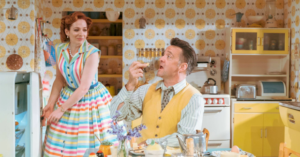2 August 2018
Home, I’m Darling ( a play by Laura Wade)
The National Theatre
reviewed by Adam McCormack
Star rating: ****
 04Nostalgia is not what it used to be. Johnny and Judy seem the ideal of domestic bliss and can’t stop telling each other how perfect their lives are. Judy is a model housewife, keeping a spotless kitchen in a house with a carefully chosen décor and all the trappings of a post-war aspirational household. Johnny is a hard-working estate agent and is hoping for a promotion. What could possibly be wrong with this almost too idealised version of a 1950’s lifestyle. The problem is – it is not the 1950s. It is 2018 and Johnny and Judy have chosen to live this way. Beneath the surface lie the reasons why and soon they have to confront whether the pressures of modern society can allow them to continue.
04Nostalgia is not what it used to be. Johnny and Judy seem the ideal of domestic bliss and can’t stop telling each other how perfect their lives are. Judy is a model housewife, keeping a spotless kitchen in a house with a carefully chosen décor and all the trappings of a post-war aspirational household. Johnny is a hard-working estate agent and is hoping for a promotion. What could possibly be wrong with this almost too idealised version of a 1950’s lifestyle. The problem is – it is not the 1950s. It is 2018 and Johnny and Judy have chosen to live this way. Beneath the surface lie the reasons why and soon they have to confront whether the pressures of modern society can allow them to continue.
Judy was a successful businesswoman (earning more than Johnny) who took the opportunity of redundancy to escape the pressures of working life. With Johnny’s sales figures looking encouraging they decided to indulge their passion for the 1950’s by transforming their house, and adopting a lifestyle, where she cooks, cleans and entertains, while he works to provide. This is a lifestyle that they revere due to their passion for all things “50s” and holidays at themed music festivals. The problems with the arrangement develop as Johnny’s income fails to meet their needs and the bank threatens to repossess. Johnny’s new boss, Alex (very much a career oriented woman of today), sees his adoption of a dated dress style as inhibiting his sales figures, and is giving the promotion to someone younger and less experienced. The contrast between Judy and Alex is stark; Judy is all blouses, full skirts and cooking, while Alex has non-stop productive energy and is clad in shirt and trousers. This contrast is also having an impact on Johnny – who is starting to have feelings for Alex.
The situation develops with the interaction of Johnny and Judy with their best friends Marcus and Fran who, while they too love a weekend at a 1950’s music festival, have not chosen the lifestyle. The issues are further explored by the interventions of Jenny’s disapproving mother, Sylvia, a woman whose own troubled marriage and issues with domesticity make it difficult for her to have sympathy with Judy’s choices.
Katherine Parkinson is superb as Judy, making us fully appreciate why someone would want to step away from the pressures on a modern woman, yet ultimately have the determination to do all she can to preserve her marriage and her home. Richard Harrington is the ideal counterpart, as Johnny, a man who is keen to keep everyone happy, yet can’t escape the attractions of the life that they are avoiding and the frustrations of the one they have chosen. The set is a perfect depiction of a stylized 1950’s house and the set changes occur via choreographed 1950’s dance moves, all of which adds to the effect.
While we all may look back at previous eras as time when life was less complicated and ultimately happier, Laura Wade’s play is a perfect examination of how such a rose-tinted view is distinctly cloudy. Our attitudes to work and domesticity have come a long way in the last 60 years and much of this progress has been very positive. This play has an ultimately uplifting message which, by stopping short of becoming too dark, is conveyed with charm and intelligence.


